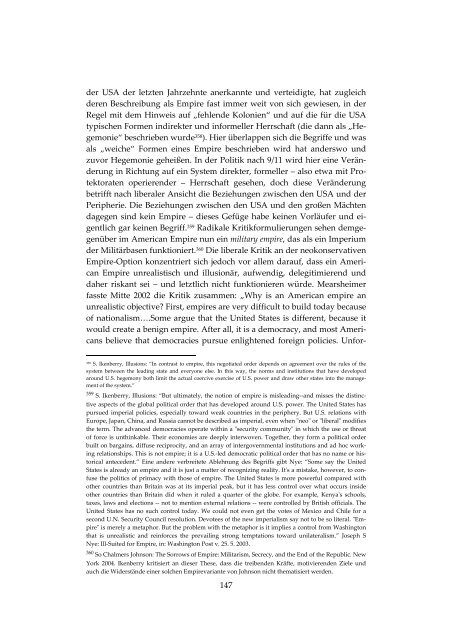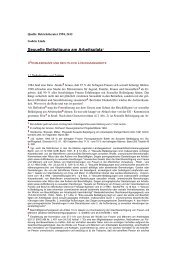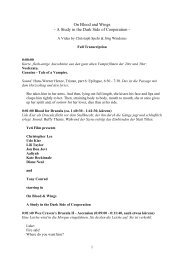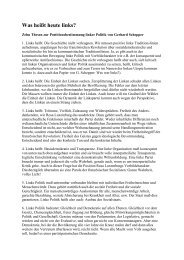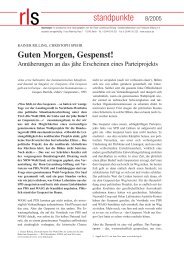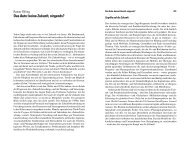outbreak. let's take over. american empire als wille ... - Rainer Rilling
outbreak. let's take over. american empire als wille ... - Rainer Rilling
outbreak. let's take over. american empire als wille ... - Rainer Rilling
Sie wollen auch ein ePaper? Erhöhen Sie die Reichweite Ihrer Titel.
YUMPU macht aus Druck-PDFs automatisch weboptimierte ePaper, die Google liebt.
der USA der letzten Jahrzehnte anerkannte und verteidigte, hat zugleich<br />
deren Beschreibung <strong>als</strong> Empire fast immer weit von sich gewiesen, in der<br />
Regel mit dem Hinweis auf „fehlende Kolonien“ und auf die für die USA<br />
typischen Formen indirekter und informeller Herrschaft (die dann <strong>als</strong> „Hegemonie“<br />
beschrieben wurde 358 ). Hier überlappen sich die Begriffe und was<br />
<strong>als</strong> „weiche“ Formen eines Empire beschrieben wird hat anderswo und<br />
zuvor Hegemonie geheißen. In der Politik nach 9/11 wird hier eine Veränderung<br />
in Richtung auf ein System direkter, formeller – <strong>als</strong>o etwa mit Protektoraten<br />
operierender – Herrschaft gesehen, doch diese Veränderung<br />
betrifft nach liberaler Ansicht die Beziehungen zwischen den USA und der<br />
Peripherie. Die Beziehungen zwischen den USA und den großen Mächten<br />
dagegen sind kein Empire – dieses Gefüge habe keinen Vorläufer und eigentlich<br />
gar keinen Begriff. 359 Radikale Kritikformulierungen sehen demgegenüber<br />
im American Empire nun ein military <strong>empire</strong>, das <strong>als</strong> ein Imperium<br />
der Militärbasen funktioniert. 360 Die liberale Kritik an der neokonservativen<br />
Empire-Option konzentriert sich jedoch vor allem darauf, dass ein American<br />
Empire unrealistisch und illusionär, aufwendig, delegitimierend und<br />
daher riskant sei – und letztlich nicht funktionieren würde. Mearsheimer<br />
fasste Mitte 2002 die Kritik zusammen: „Why is an American <strong>empire</strong> an<br />
unrealistic objective? First, <strong>empire</strong>s are very difficult to build today because<br />
of nationalism….Some argue that the United States is different, because it<br />
would create a benign <strong>empire</strong>. After all, it is a democracy, and most Americans<br />
believe that democracies pursue enlightened foreign policies. Unfor-<br />
358<br />
S. Ikenberry, Illusions: “In contrast to <strong>empire</strong>, this negotiated order depends on agreement <strong>over</strong> the rules of the<br />
system between the leading state and everyone else. In this way, the norms and institutions that have developed<br />
around U.S. hegemony both limit the actual coercive exercise of U.S. power and draw other states into the management<br />
of the system.”<br />
359 S. Ikenberry, Illusions: “But ultimately, the notion of <strong>empire</strong> is misleading--and misses the distinctive<br />
aspects of the global political order that has developed around U.S. power. The United States has<br />
pursued imperial policies, especially toward weak countries in the periphery. But U.S. relations with<br />
Europe, Japan, China, and Russia cannot be described as imperial, even when ʺneoʺ or ʺliberalʺ modifies<br />
the term. The advanced democracies operate within a ʺsecurity communityʺ in which the use or threat<br />
of force is unthinkable. Their economies are deeply interwoven. Together, they form a political order<br />
built on bargains, diffuse reciprocity, and an array of interg<strong>over</strong>nmental institutions and ad hoc working<br />
relationships. This is not <strong>empire</strong>; it is a U.S.-led democratic political order that has no name or historical<br />
antecedent.” Eine andere verbreitete Ablehnung des Begriffs gibt Nye: “Some say the United<br />
States is already an <strong>empire</strong> and it is just a matter of recognizing reality. Itʹs a mis<strong>take</strong>, however, to confuse<br />
the politics of primacy with those of <strong>empire</strong>. The United States is more powerful compared with<br />
other countries than Britain was at its imperial peak, but it has less control <strong>over</strong> what occurs inside<br />
other countries than Britain did when it ruled a quarter of the globe. For example, Kenyaʹs schools,<br />
taxes, laws and elections -- not to mention external relations -- were controlled by British offici<strong>als</strong>. The<br />
United States has no such control today. We could not even get the votes of Mexico and Chile for a<br />
second U.N. Security Council resolution. Devotees of the new imperialism say not to be so literal. ʺEmpireʺ<br />
is merely a metaphor. But the problem with the metaphor is it implies a control from Washington<br />
that is unrealistic and reinforces the prevailing strong temptations toward unilateralism.” Joseph S<br />
Nye: Ill-Suited for Empire, in: Washington Post v. 25. 5. 2003.<br />
360 So Chalmers Johnson: The Sorrows of Empire: Militarism, Secrecy, and the End of the Republic. New<br />
York 2004. Ikenberry kritisiert an dieser These, dass die treibenden Kräfte, motivierenden Ziele und<br />
auch die Widerstände einer solchen Empirevariante von Johnson nicht thematisiert werden.<br />
147


